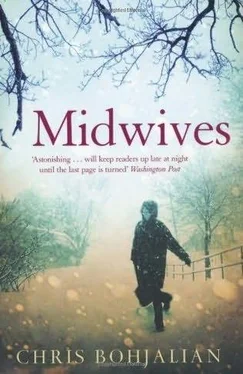Chris Bohjalian - Midwives
Здесь есть возможность читать онлайн «Chris Bohjalian - Midwives» весь текст электронной книги совершенно бесплатно (целиком полную версию без сокращений). В некоторых случаях можно слушать аудио, скачать через торрент в формате fb2 и присутствует краткое содержание. Жанр: Современная проза, на английском языке. Описание произведения, (предисловие) а так же отзывы посетителей доступны на портале библиотеки ЛибКат.
- Название:Midwives
- Автор:
- Жанр:
- Год:неизвестен
- ISBN:нет данных
- Рейтинг книги:5 / 5. Голосов: 1
-
Избранное:Добавить в избранное
- Отзывы:
-
Ваша оценка:
- 100
- 1
- 2
- 3
- 4
- 5
Midwives: краткое содержание, описание и аннотация
Предлагаем к чтению аннотацию, описание, краткое содержание или предисловие (зависит от того, что написал сам автор книги «Midwives»). Если вы не нашли необходимую информацию о книге — напишите в комментариях, мы постараемся отыскать её.
Midwives — читать онлайн бесплатно полную книгу (весь текст) целиком
Ниже представлен текст книги, разбитый по страницам. Система сохранения места последней прочитанной страницы, позволяет с удобством читать онлайн бесплатно книгу «Midwives», без необходимости каждый раз заново искать на чём Вы остановились. Поставьте закладку, и сможете в любой момент перейти на страницу, на которой закончили чтение.
Интервал:
Закладка:
Some midwives dedicated births to her, and I don't believe there was a baby born at home in Vermont over the next six or seven months whose picture wasn't presented to Sibyl as a boost to her morale: This, said those snapshots and portraits of boys and girls born in bedrooms and living rooms, is what you're defending. This is why you must fight. I know of at least three young women living in Vermont today who are named Sibyl, each of whom was a baby born at home in the summer or fall of 1981, their names a not insignificant homage to my mother.
And, of course, the midwives helped out my mother by accepting her pregnant clients as patients, once the State insisted she stop practicing, at least temporarily, as a condition for bail. Often they actually conducted the prenatals in the women's homes to save them the additional burden of traveling after the trauma of losing their midwife.
Most of the time, I think, my father was glad to see my mother receiving all of this support from the midwives. It took some of the pressure off him. Sometimes it boosted his spirits, too. And as a family we really did eat very well that spring and summer. But there were other times when my father grew irritated, tired of the way his home had become a coffeehouse for a New Age world of women in sandals, for tireless earth mothers in wraparound paisley skirts. I think he found Cheryl Visco especially annoying.
The day after Charlotte had died, literally moments after my parents had returned from a Saturday spent with lawyers and emergency-room doctors, she appeared at our house with a ragged manila envelope overflowing with legal information she had amassed over the years from the Midwives Alliance of North America: the names of the women who had been tried for one reason or another, the outcomes of the cases. Bad copies of ancient newspaper articles. Lists of insurance companies. Law firms.
And in the weeks immediately after the death, when it was becoming increasingly clear that the State was slowly and methodically building a case, Cheryl would drop by almost every other day for no other reason than to offer moral support. Sometimes she'd appear with one flower, sometimes with a note card she thought was funny. Sometimes she'd have the name of a book my mother should read, sometimes she'd have the book itself.
When she arrived late on a weekday afternoon, she would stay for dinner. When she arrived on a weekend morning, she would stay for lunch. The days were indeed growing longer as March became April, but-as my father said-when Cheryl was there they seemed to last forever.
Cheryl was probably in her early fifties then, but she was still a beautiful woman. Her hair was gray, and unlike most gray hair it still looked magnificent long. It fell like curtains down her back, usually draping a tight black sweater or the top of a long-sleeved but close-fitting black dress. Cheryl was close to six feet tall, more slender than most women half her age, and the subject of all sorts of rumor and gossip: She had three children from three different fathers, only one of whom she had actually bothered to marry. While some people assumed the relationships failed for the reasons the marriages of many midwives go bad-ridiculously long hours and a completely unpredictable schedule-others attributed the fact that Cheryl was a three-time loser in love to a flighty morality and a loose set of values. If she had had one husband and two significant partners over the years, the gossips whispered, she had most certainly had thirty lovers. Maybe three hundred.
Personally, what I believe did her marriages in was her truly astonishing ability to speak for hours at a time without stopping to breathe. She could tell whole stories without ever inhaling, recount lengthy anecdotes without so much as a pause. It drove my father crazy, just as it probably drove most men in Cheryl's life away. In my experience, men aren't particularly good listeners, and to be around Cheryl for any length of time demanded patience, passivity, and an insatiable interest in Cheryl Visco's life.
Of course, Cheryl adored my mother, and in those weeks when my mother was still reeling from the death up in Lawson, Cheryl was the perfect friend: present but undemanding, company that necessitated no effort. My mother could simply sit still and listen, perhaps nod every so often if it felt right.
"Chance is the strangest word in the world, isn't it?" Cheryl might begin, speaking slowly at first but gathering momentum like an obese teenager on skis. "One syllable, six letters. It's a noun, it's a verb. Change one letter and it's an adjective. And everything about it scares the bejesus out of so many people; it's this thing they try to avoid at all costs. Don't travel to the Middle East these days-there's a chance something could happen. Don't get involved with that new fellow on Creamery Street-I hear a lot of mud was scraped off his floor after the divorce. Don't have your baby at home-there's a chance something could go wrong. Don't, don't, don't… Well, you can't live your life like that! You can't spend your entire life avoiding chance. It's out there, it's inescapable, it's a part of the soul of the world. There are no sure things in this universe, and it's absolutely ridiculous to try and live like there are! There's nothing that drives me crazier than when people say home birth is chancy or irresponsible or risky. My God, so what if it is? Which, in my opinion, of course, it isn't. What's the price of attempting to eliminate chance, or trying to better the odds? A sterile little world with bright hospital lights? A world where forceps replace fingers? Where women get IVs and epidurals instead of herbs? Sure, we can cut down the risk, but we also cut off a lot of touching and loving and just plain human connection. No one said living isn't a pretty chancy business, Sibyl. No one gets out of here alive."
Although Cheryl lived over an hour away in Waterbury, she would sometimes stay until ten or eleven o'clock at night. Some nights when I would go upstairs to do my homework or call one of my friends around eight or eight-thirty, I would leave her lecturing my parents. I'd hear my father escaping soon after, trudging upstairs with the excuse that he was tired. Later, when Cheryl had finally gone home and my mother had struggled upstairs herself, I'd hear my father comment angrily on Cheryl's uncanny ability to outstay her welcome. Some nights his tone was more caustic than others; some nights his voice was louder.
On the quieter nights he might simply remark, "She can't keep a husband because she can't shut up." But when he was particularly disgusted or he'd had an extra scotch during dinner, I might hear him raise his voice as he said, "We have enough stress in our lives without her! The next time she shows up and won't leave, call me. Call me and I'll sleep at the damn office."
My mother would then shut their bedroom door, and I would wait silently at my desk, listening, wondering if tonight the fight would blow up or blow over.
We learned on Monday night what had happened to Anne Austin, my mother's apprentice. We didn't learn because the woman herself called my mother back, or because she finally answered the phone one of the many times my mother called her. We didn't learn because she appeared at our door after Stephen Hastings and his photographer left, or because we ran into her while shopping at the supermarket.
We learned because B.P. Hewitt-Dr. Brian Hewitt-called from the hospital during dinner and said he wanted to drop by when he finished his rounds. My parents said sure, and much of our conversation as we finished our meal revolved around why my mother's backup physician wanted to come by our house. As far as I knew, he'd only been here once before, and that was three years earlier when it seemed half the county was in our yard for the "graduation" party of sorts my mother held for Heather Reed, an apprentice who'd been with my mother for at least half a decade and was about to embark on a career of her own.
Читать дальшеИнтервал:
Закладка:
Похожие книги на «Midwives»
Представляем Вашему вниманию похожие книги на «Midwives» списком для выбора. Мы отобрали схожую по названию и смыслу литературу в надежде предоставить читателям больше вариантов отыскать новые, интересные, ещё непрочитанные произведения.
Обсуждение, отзывы о книге «Midwives» и просто собственные мнения читателей. Оставьте ваши комментарии, напишите, что Вы думаете о произведении, его смысле или главных героях. Укажите что конкретно понравилось, а что нет, и почему Вы так считаете.











